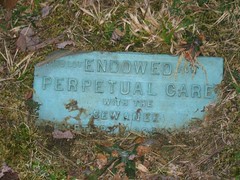| Official Survivor Congratulations! You scored 59! |
| Whether through ferocity or quickness, you made it out. You made the right choice most of the time, but you probably screwed up somewhere. Nobody’s perfect, at least your alive. |
| Link: The Zombie Scenario Survivor Test written by ci8db4uok on Ok Cupid |
Sewanee Cemetery
One of the wierder sections of Betsy’s contract with The University of the South is that as a tenure track professor she has a right to a plot in the University Cemetery. It’s a very old cemetery for this part of the country, with gravesites dating to before the Civil War. The photo is one of the plot markers that dot the ground among the graves.
Kelsi at Aquarium
Bets in Chapel Hill
Via the power of the camera phone, email, Flicker, Travis, and the general coolness of teh Intarweb, I present: Betsy on vacation in Chapel Hill. Looks like she’s on the way to lunch at Elmo’s Diner. Meanwhile, I’m at home in TN with the new puppy and a bunch of horror films. Let the weekend commence!
Hippiepunk
Take a look…an amazing snippet of a news piece from the CBC from 1967 about the Hippie movement in Yorkville. Why should you watch this? Because the hippie that is interviewed at the beginning of the piece, Bill, is now better known as William Gibson, one of the founders of the cyberpunk movement of sci-fi and the writer of the book after which this blog is named.
Really a great window into the world of 1967, but it is incredible to look at that 19 year old and see and hear in him the author that would come to be.
Stranger in a Strange Land
One of my all time favorite novels, recently re-read. Heinlein certainly had his problems…his portrayals of women especially should raise a few eyebrows, but the theme of the book is still a powerful one. One of the first pure sci-fi books I was able to convince Betsy to read, and it even won her over.
Structured Blogging
There’s a new wordpress plugin called Structured Blogging that I’m checking out, and that might be interesting to a few of you out there (esp. the librarians). The basic concept is explained on the site Structured Blogging…here’s an excerpt:
Using structured blogging means it’s easy to create, edit, and maintain these different kinds of posts. In fact, for most purposes, structured blogging won’t really seem like a big deal at all – it’s just another edit form on your blog. The difference is that the structure will let you add specific styles to each type, add links and pictures for reviews, and so on.
Once structured blogging is in place, you can start building applications on top of it. Because it’s an XML format and embedded in both the HTML blog and the syndicated feed, applications can run in web browsers (like a firefox plugin for comparison shopping which reads product reviews); aggregators (like an aggregator that adds your friend’s calendar entries to your datebook); or web services (like a feed for everyone who’s attending the same conference as you).
So, effectively, it’s a way of wrapping XML Metadata around the content of blog posts in specific ways that relate to the content of the posts. Review posts will have fields that are common to reviews, and can then be manipulated in specific ways by aggregators/datamining that wouldn’t be possible previously. It’s a really interesting idea, and I’d been searching for ways to incorporate something like this in my blog. Rather than having a “currently reading” sidebar, including my current reads inline with the rest of the blog, thus maintaining the calendar of my reading for myself, and putting it into the metadata of my blog for future perusal.
I’m gonna try a “Review” post next just to see what it looks like, but this could be a great, great tool for specific types of blogs (Jackson has been doing a series of reviews on his blog…this would be perfect for that).
Well, we’ve already seen what Gorman (the President-Elect of the American Library Association) thinks of blogs and the blog people. Now we get his comments on Google and the Google Digitization Project in the latest issue of American Libraries.
*sigh*
To the quotes!
Since scholarly books are, with few exceptions, intended to be read cumulatively and not consulted for snippets of information, making those that are out of copyright available by means of a notoriously fallible search engine seems to be, at best, a misallocation of resources.
At best a misallocation of resource? It appears that Gorman believes that people are interested in the Google Dig project in order to find primary materials for research. While that might be ONE reason for something like the GDP, it certainly doesn’t strike me as the way it will popularly be used. I see the GDP being used as a quick and easy way to find quotes, to locate books when all you have is a quote (how many times have reference librarians had to spend hours figuring out where famous quote from scholar X came from?), to do intertextual comparisons that are simply not possible with print resources (I see massive digitization projects like GDP as potentially the biggest innovation in linguistic/pattern related text study ever), and yes, sometimes, to serve as a quick and easy method for those that are not near a library that has access to these works to read them.
And I really want to know what his justification for the “notoriously fallible” line is. That’s just incredibly sloppy writing, to make a judgement like that and not back it up. Then again, it appears that’s what Gorman is really good at, given his last couple of publications.
Any user of Google knows that it is pathetic as an information-retrieval system — utterly lacking in both recall and precision, the essential criteria for efficiency in such systems.
Utterly lacking? Utterly lacking?
At this point I just want to know what planet Gorman has been on for the last 5-7 years.
Google is by far the best search engine on the Internet, indexing and making searchable over, at the time of this posting, 8,058,044,651 web pages. That’s EIGHT BILLION pages. Mr. Gorman…I would love to see your suggestions for a better way to index 8 Billion pieces of disparate information.
Statements like that only show how out of touch Gorman is with the reality of information seekers.
Also, no amount of “research on search engines” is going to overcome the fundamental fact that free-text searching is inherently inferior to controlled-vocabulary systems….Google is supposed to have complex algorithms but still produces piles of rubbish for almost all searches.
And speaking of out of touch with information seekers…Mr. Gorman, there is a reason that our patrons want our OPACs to be “google easy” to use. It’s because Google, as far as the only audience that matters (the patron) gets them the information they need without the need for them to become experts in a controlled vocabulary. Would it be great if everyone memorized LoC subject headings and used them to search for what they need? Possibly. But that will never happen, and in the meantime while we’re waiting on that, full-text searches are the way people find information.
I can only guess again that Gorman actually means something like “Google produces piles of rubbish for specific kinds of searches that I can’t bother to deliniate right now” because it is a demonstrable fact that Google does provide good results. Want to know what demonstrates that? The fact that everyone uses it. The fact that it’s a freaking verb at this point in time. Heck, I can produce excellent results for Google searches, and I don’t try very hard. I have not yet had Google let me down when I need a factual answer to some question (and contrary to Mr. Gorman’s unspoken assumptions, that is what most people are after…random facts).
I can’t describe how disappointed I am in the President-Elect of the ALA. He’s not only come across as petulant and out of touch in his writings, but has repeatedly denegrated technologies that are useful and, in Google’s case, necessary for information seeking at this point in history. For someone who is supposed to be leading the ALA, it appears that his leadership might be in directions that most newer librarians aren’t very happy with. We already have to swim against the current of the established order of things in Library Land. Gorman is simply adding fuel to the fire of the next generation of librarians to come along and revolutionize our understanding of information seeking and gathering.
EDIT: A bit of conversation going on re: this topic over at lisnews.com.
I want to be a Tarheel Lucha
Found via Justin, Tim over a Tuba City with the all-time coolest sewing adventure ever…the story of the Tarheel Luchadores! Am I the only one that thinks this is a ripe photo for a Fark photoshop contest? 🙂
Oh yeah: Duke Sucks. Go Heels!
EDIT: Also seen on The Real Paul Jones.
Sci-fi Channel is teh hawt
So evidently, somewhere in the vast media conspiracy against fair use and copyright, someone bought a clue.
The Sci-Fi channel (naturally) has offered the first episode of Battlestar Galactica as a streaming video (the whole episode, commercial free). They also have a blog where the Exec. Producer Ron Moore updates the public on things and answers plot questions. And, to finish off the hat-trick of coolness, they just started doing podcasts of commentaries by Ron on each episode. You set up the podcast, or just download the MP3’s from their site, hit play at the appropriate time, and the commentary will overlay the actual episode. It even beeps when a commercial is about to come on so you can pause the playback. Such very cool technology usage…not only that they are doing podcasts, but they are doing them in such a new and different way. Real-time commentary on a broadcast TV show via podcast is, to put it simply, cool. And by cool, I mean something that I would never have thought of.



